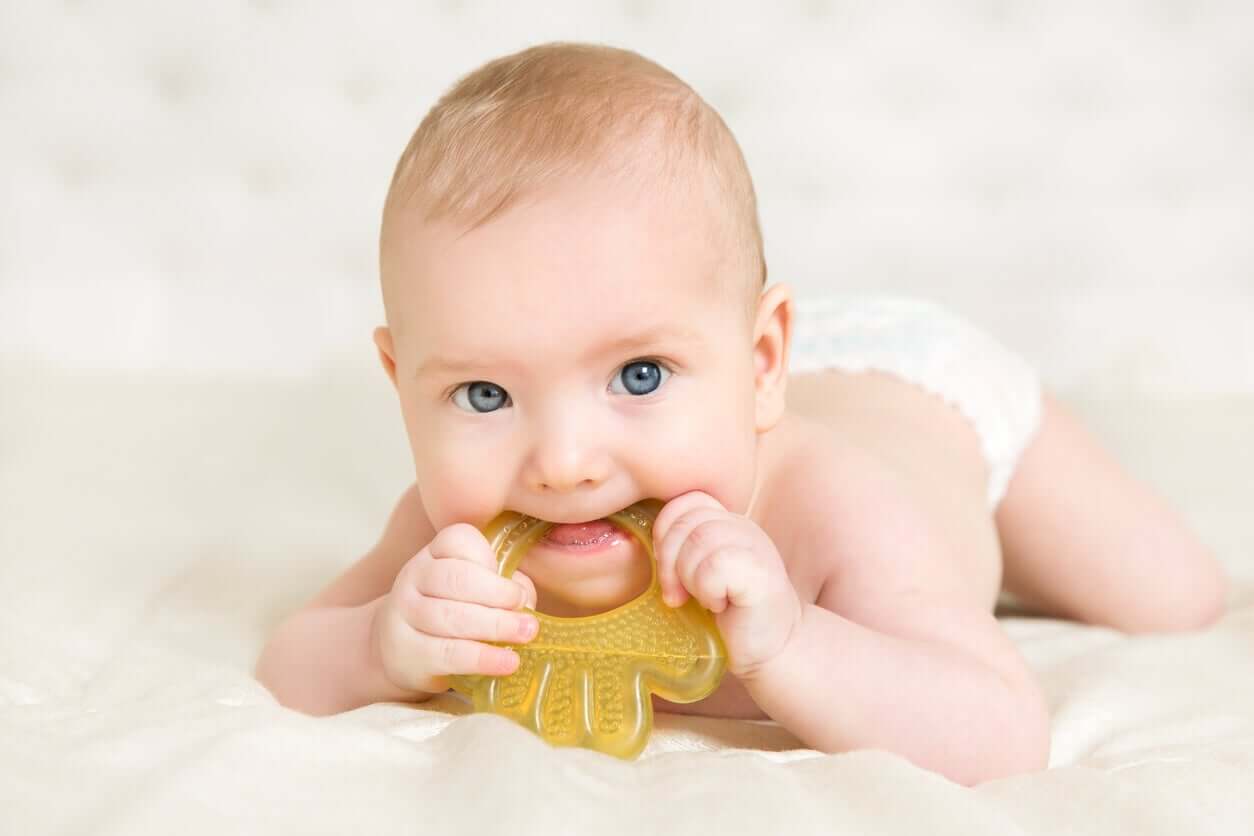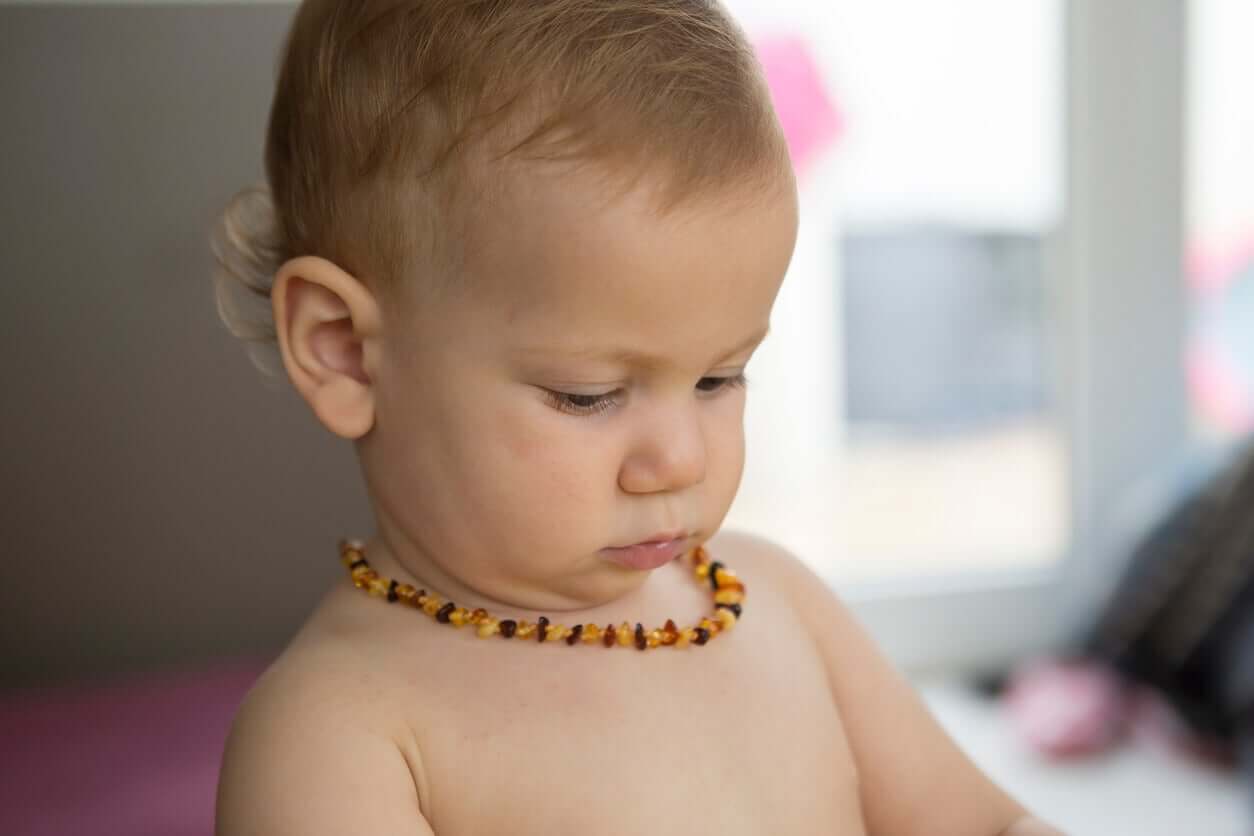Natural Remedies for Teething

For some babies, teething can be an unpleasant and difficult time. That’s why some parents turn to natural remedies for teething in order to alleviate the symptoms. However, they do so without really knowing if they’re actually effective–or safe.
In this article, we explain some practices and natural remedies for teething that can calm these dental discomforts and, also, we’ll tell you why it’s not a good idea to use certain products that are very popular. Keep reading and find out more.
Natural remedies for teething
The eruption of the first teeth can be quite annoying for some children. It’s common in this stage for them to drool excessively, put everything in their mouths, bite it intensely, cry without an apparent cause, and not sleep well.
For this reason, parents experiment with any possible strategy to alleviate these discomforts for their little ones. However, the most important thing is to stay calm and act responsibly, as not all alternatives are safe for the baby.
Below, we’ll share some natural remedies for teething that parents can use without problems.
Apply cold to the gums
The action of cold on the tissues of the mouth produces an anti-inflammatory and numbing effect that reduces pain and other annoying sensations. It’s a good idea to offer cool play items, such as teethers, that are suitable for placing in the refrigerator. But, if you don’t have one on hand, you can replace it with any safe object in the house, such as spoons or a small towel.
For children who are already eating, offering fresh fruits or vegetables is another option. A cooled cooked banana or carrot chunks are a healthy snack that can offer relief from swollen gums. An adult should always supervise the little one to avoid choking.
Everything that you offer your little one should be cooled in the refrigerator and not in the freezer, as very extreme temperatures can damage and burn the gums of babies.

Massage the gums
During teething, it’s common for babies to want to bite down hard on anything that’s within their reach. Pressure on the gums reduces the pain and discomfort that they feel.
Parents can use their clean fingers and knuckles to apply pressure and massage their little one’s gums. You can so use a damp gauze or silicone brush for the same purpose, while at the same time sanitizing the mouth.
If the child’s already eating, offering some solid edibles with different textures is also another option for stimulating the gum tissue. Among them, toast, bread, and fresh fruits or vegetables are some suitable alternatives.
Offer relaxing massages to the baby
In order to calm your little one, promote relaxation and rest, you can resort to body massages. These help to stimulate certain specific areas through movements in different directions for a few minutes.
One of the ideal areas to massage in these cases is on the back of the hand. You should apply the movements on the angle formed between the thumb and index finger. Another area to stimulate is on the outer edge of the second toe. And the best time to offer it is when the baby has already rested.
Although there’s no scientific evidence in this regard, some massage therapists claim that these points relieve pain in the gums. In any case, relaxation and connection between the baby and their parents are likely to help the process go smoother.
Maintain breastfeeding
If your baby is breastfeeding, breastfeeding them often will give them comfort and relief. The suction and the tranquility that contact with their mother provides are one of the most natural and effective natural remedies for teething discomfort.
Some mothers may fear the baby’s bites, but this doesn’t always happen. If your baby does bite you, simple communication is enough for them to understand that they shouldn’t hurt mom.
The baby’s teeth erupting is no reason to stop breastfeeding. On the contrary, sustaining it is a good strategy.
Natural remedies for teething that you should avoid
There are some popular beliefs and sayings about the benefits of using some natural remedies, but they are not always proven by scientific studies. Thus, it is not advised to use them in children because it has not been proven that they are safe for them.
Next, we’ll mention some popular products and customs that can be very dangerous for the health of children:
- Chamomile tea: The use of teas in children is discouraged due to the risk of poisoning and other serious adverse effects.
- Vanilla extract: Rubbing a few drops of vanilla extract on the baby’s gums isn’t recommended, as its effectiveness hasn’t been proven. In addition, its high content of sugar and additives can cause health problems for the child
- Clove oil: This has an anti-inflammatory component that’s capable of soothing toothache. However, for babies, placing it on the gums to soothe pain could further irritate the tissue.
- Ginger: Rubbing ginger root on the gums favors the absorption of its components, which can be toxic for the baby.
- Amber Necklaces: These accessories are made from amber beads and are meant to hang from the neck, wrist, or ankle of babies. In addition to the fact that their effectiveness isn’t proven, they also constitute a risk factor for choking, suffocation, and strangulation.

Responsible relief
It’s true that teething can be an annoying and difficult time for both babies and parents. And it’s also understandable that, out of desperation, they try to resort to whatever magic solution is presented to them. But beware! You need to be sure to resort to practices or products that have been scientifically proven to be safe and effective.
Tooth eruption is a normal growth process in children and you don’t need to be alarmed or seek relief at any cost.
Acting responsibly, patiently, and in a loving way is essential when it comes to going through this stage in the safest and most natural way. And if you have any doubts or your little one feels too upset, consulting your pediatrician is always the best alternative.
For some babies, teething can be an unpleasant and difficult time. That’s why some parents turn to natural remedies for teething in order to alleviate the symptoms. However, they do so without really knowing if they’re actually effective–or safe.
In this article, we explain some practices and natural remedies for teething that can calm these dental discomforts and, also, we’ll tell you why it’s not a good idea to use certain products that are very popular. Keep reading and find out more.
Natural remedies for teething
The eruption of the first teeth can be quite annoying for some children. It’s common in this stage for them to drool excessively, put everything in their mouths, bite it intensely, cry without an apparent cause, and not sleep well.
For this reason, parents experiment with any possible strategy to alleviate these discomforts for their little ones. However, the most important thing is to stay calm and act responsibly, as not all alternatives are safe for the baby.
Below, we’ll share some natural remedies for teething that parents can use without problems.
Apply cold to the gums
The action of cold on the tissues of the mouth produces an anti-inflammatory and numbing effect that reduces pain and other annoying sensations. It’s a good idea to offer cool play items, such as teethers, that are suitable for placing in the refrigerator. But, if you don’t have one on hand, you can replace it with any safe object in the house, such as spoons or a small towel.
For children who are already eating, offering fresh fruits or vegetables is another option. A cooled cooked banana or carrot chunks are a healthy snack that can offer relief from swollen gums. An adult should always supervise the little one to avoid choking.
Everything that you offer your little one should be cooled in the refrigerator and not in the freezer, as very extreme temperatures can damage and burn the gums of babies.

Massage the gums
During teething, it’s common for babies to want to bite down hard on anything that’s within their reach. Pressure on the gums reduces the pain and discomfort that they feel.
Parents can use their clean fingers and knuckles to apply pressure and massage their little one’s gums. You can so use a damp gauze or silicone brush for the same purpose, while at the same time sanitizing the mouth.
If the child’s already eating, offering some solid edibles with different textures is also another option for stimulating the gum tissue. Among them, toast, bread, and fresh fruits or vegetables are some suitable alternatives.
Offer relaxing massages to the baby
In order to calm your little one, promote relaxation and rest, you can resort to body massages. These help to stimulate certain specific areas through movements in different directions for a few minutes.
One of the ideal areas to massage in these cases is on the back of the hand. You should apply the movements on the angle formed between the thumb and index finger. Another area to stimulate is on the outer edge of the second toe. And the best time to offer it is when the baby has already rested.
Although there’s no scientific evidence in this regard, some massage therapists claim that these points relieve pain in the gums. In any case, relaxation and connection between the baby and their parents are likely to help the process go smoother.
Maintain breastfeeding
If your baby is breastfeeding, breastfeeding them often will give them comfort and relief. The suction and the tranquility that contact with their mother provides are one of the most natural and effective natural remedies for teething discomfort.
Some mothers may fear the baby’s bites, but this doesn’t always happen. If your baby does bite you, simple communication is enough for them to understand that they shouldn’t hurt mom.
The baby’s teeth erupting is no reason to stop breastfeeding. On the contrary, sustaining it is a good strategy.
Natural remedies for teething that you should avoid
There are some popular beliefs and sayings about the benefits of using some natural remedies, but they are not always proven by scientific studies. Thus, it is not advised to use them in children because it has not been proven that they are safe for them.
Next, we’ll mention some popular products and customs that can be very dangerous for the health of children:
- Chamomile tea: The use of teas in children is discouraged due to the risk of poisoning and other serious adverse effects.
- Vanilla extract: Rubbing a few drops of vanilla extract on the baby’s gums isn’t recommended, as its effectiveness hasn’t been proven. In addition, its high content of sugar and additives can cause health problems for the child
- Clove oil: This has an anti-inflammatory component that’s capable of soothing toothache. However, for babies, placing it on the gums to soothe pain could further irritate the tissue.
- Ginger: Rubbing ginger root on the gums favors the absorption of its components, which can be toxic for the baby.
- Amber Necklaces: These accessories are made from amber beads and are meant to hang from the neck, wrist, or ankle of babies. In addition to the fact that their effectiveness isn’t proven, they also constitute a risk factor for choking, suffocation, and strangulation.

Responsible relief
It’s true that teething can be an annoying and difficult time for both babies and parents. And it’s also understandable that, out of desperation, they try to resort to whatever magic solution is presented to them. But beware! You need to be sure to resort to practices or products that have been scientifically proven to be safe and effective.
Tooth eruption is a normal growth process in children and you don’t need to be alarmed or seek relief at any cost.
Acting responsibly, patiently, and in a loving way is essential when it comes to going through this stage in the safest and most natural way. And if you have any doubts or your little one feels too upset, consulting your pediatrician is always the best alternative.
All cited sources were thoroughly reviewed by our team to ensure their quality, reliability, currency, and validity. The bibliography of this article was considered reliable and of academic or scientific accuracy.
- De Rossi, A., Nelson-Filho, P., De Rossi, M., Huamán, S. D., & Vilela, M. M. (2020). Odontología para bebés: una posibilidad práctica de promoción de salud bucal. Revista de Odontopediatría Latinoamericana, 7(2), 116-126. Disponible en: https://www.medigraphic.com/pdfs/alop/rol-2017/rol172e.pdf
- Bernal, M. D. L. A. M. (2019). SALUD BUCODENTAL EN EL BEBE. El monstruo de Einstein: la primera imagen de un agujero negro, 6(2), 24.
- Navarro Nápoles, J., Cobas Perez, N., & Pardo Gonzalez, M. I. Factores de riesgo de la erupción dentaria temporal. Convención Internacional de Salud, Cuba Salud 2018. [Internet] Disponible en: http://www.convencionsalud2018.sld.cu/index.php/connvencionsalud/2018/paper/view/1365
- de la Teja Ángeles, E., Garza-Elizondo, R., & Durán-Gutiérrez, L. A. (2021). Erupción dental difícil. Acta Pediátrica de México, 42(4). Disponible en: https://www.medigraphic.com/cgi-bin/new/resumen.cgi?IDARTICULO=100741
- Cox, C., Petrie, N., & Hurley, K. F. (2017). Infant strangulation from an amber teething necklace. Canadian journal of emergency medicine, 19(5), 400-403. Disponible en: https://www.cambridge.org/core/journals/canadian-journal-of-emergency-medicine/article/infant-strangulation-from-an-amber-teething-necklace/FFC34EED90F36FF5C6D3286FBF78EF25
- Bhavneet, K. (2012). Awareness of parents towards teething. Bangladesh Journal of Medical Science, 11(1), 40-43. Disponible en: https://www.cambridge.org/core/journals/canadian-journal-of-emergency-medicine/article/infant-strangulation-from-an-amber-teething-necklace/FFC34EED90F36FF5C6D3286FBF78EF25
- El-Gilany, A. H., & Abusaad, F. E. S. (2017). Mothers’ teething beliefs and treatment practices in Mansoura, Egypt. The Saudi dental journal, 29(4), 144-148.
- Murshid, E. Z. (2006). The effect of various factors on Saudi mothers’ beliefs regarding symptoms associated with teething. Pakistan Oral Dent J, 26(1), 109-114.
- Rekik, Y., Ben Daya, M., & Jemmali, B. (2017). Parent Beliefs about Infant Teething and Mothers’ Practices: A Survey of Tunisian Parents. Int J Dentistry Oral Sci, 4(5), 476-480.
- Al–Sayagh, G. D., Al–Rawi, B. A., & Yassen, G. H. (2008). Experience of Mothers about their Infants’ Teething in Mosul City. Al-Rafidain Dental Journal, 8(1), 61-66.
- Montes Bello, C. G. (2021). Nivel de conocimiento sobre salud oral y lactancia en puérperas del Hospital Nacional Daniel Alcides Carrión en el año 2020.
This text is provided for informational purposes only and does not replace consultation with a professional. If in doubt, consult your specialist.








